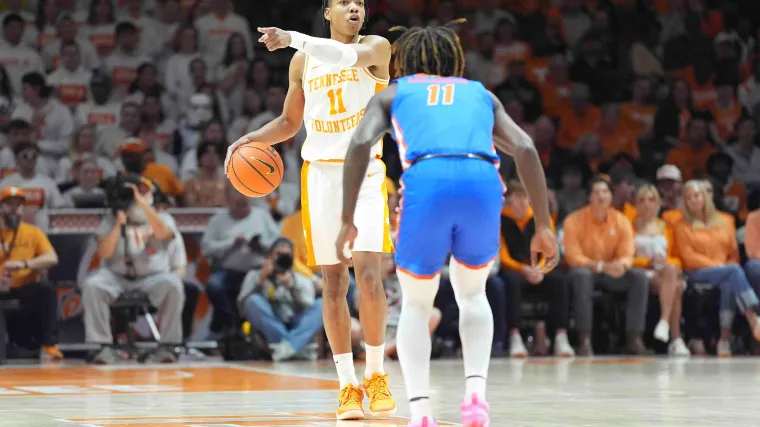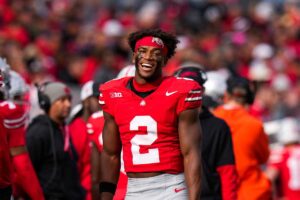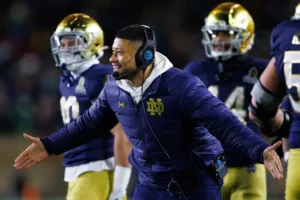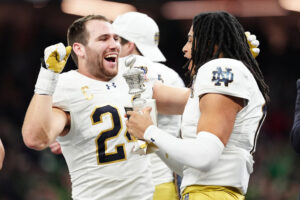
Denzel Aberdeen wasn’t a household name when he first committed to the University of Florida. A product of Dr. Phillips High School in Orlando, Florida, Aberdeen had a strong senior campaign and was considered a promising three-star recruit. His early time with the Gators showed flashes of potential—quick handles, a confident pull-up jumper, and a relentless motor. But his minutes were inconsistent, and it often felt like he was overlooked in the Gators’ rotation.
Still, Aberdeen stuck with the program. He played behind more experienced guards and waited for his chance. His development peaked during his junior year, when he became a clutch contributor in Florida’s deep March Madness run. He earned praise from media and analysts alike, not just for his stats, but for his poise in big moments.
And yet, when the season ended, he entered the transfer portal.
To some, the move was puzzling. To those close to the program—and especially to those who know the Aberdeen family—it wasn’t surprising at all.
A Father’s Voice Cuts Through the Noise
In a heartfelt and pointed interview that quickly went viral on social media, Aberdeen’s father, Derrick Aberdeen, didn’t mince words:
“Denzel gave that program his heart. He stayed when others left. He waited. He worked. And yet, it felt like he was always being told he wasn’t enough. Coach Golden never really believed in him. That’s not just bad coaching—that’s bad leadership.”
The remark struck a nerve. Derrick Aberdeen wasn’t just lashing out. His tone was measured, his frustration years in the making. Parents in college sports are usually quiet observers, but when they speak up, it often resonates—especially when it’s about belief, opportunity, and respect.
The statement became a rallying cry for others who felt similarly about Golden’s handling of younger players. On message boards, fans debated whether Golden’s system had stifled talent or simply prioritized experience and results. Either way, Denzel’s transfer—and his father’s words—cast a spotlight on Florida’s internal dynamics.
The Kentucky Fit: A Fresh Start
Coach John Calipari, always one to spot opportunity, welcomed Aberdeen with open arms. Known for developing guards and letting talent flourish in high-tempo systems, Calipari sees Aberdeen as a perfect piece in his 2025 backcourt.
In his first press conference since committing to Kentucky, Aberdeen kept his message simple but pointed:
“Sometimes you just want to go where you feel valued.”
It was a calm echo of his father’s more aggressive remarks. And that phrase—“where you feel valued”—traveled fast in college basketball circles. It felt like a statement not just to Florida, but to every program that fails to fully embrace the players they recruit.
Trouble in Gainesville: The Golden Era Under Fire
All of this plays out against a backdrop of controversy that extends far beyond the hardwood.
As of April 2025, Todd Golden is under investigation by the University of Florida following multiple allegations of misconduct—including sexual harassment, cyberstalking, and inappropriate behavior toward students. While Golden has denied all charges and insists the accusations are defamatory, the ongoing Title IX inquiry has already damaged his public standing.
What began as a coaching drama now bleeds into a potential institutional crisis.
Aberdeen’s father has not commented on the investigation, making clear his criticism of Golden is about on-court decisions and leadership, not legal matters. But the timing inevitably links the two issues in the public eye. Some speculate that players and families who may have tolerated Golden’s style when the program was winning are now emboldened to speak out as scrutiny intensifies.
College Sports and the Power of Perception
The transfer portal era has changed everything.
Today’s players are no longer locked into four-year commitments with limited recourse. They move when they feel undervalued. They seek better fits. And increasingly, they have platforms to tell their side of the story.
That shift in power has also amplified the voices of parents. Whether it’s LaVar Ball, RJ Barrett’s father Rowan, or now Derrick Aberdeen, the modern parent-athlete dynamic is louder, more visible, and more impactful than ever before.
Critics argue that this undermines coaching authority. Supporters say it’s a long-overdue correction in a system that has long sidelined players’ interests.
Regardless of where you stand, one thing is clear: in 2025, silence is no longer the norm.
What’s Next for Florida?
If the allegations against Golden result in disciplinary action—or if the pressure becomes too intense—it’s possible the Gators could face a leadership change. That uncertainty makes player retention even harder, especially in a competitive SEC landscape.
Florida has already lost several players to the portal this offseason. Recruits are reportedly watching the investigation closely. And with the media narrative now spotlighting the culture under Golden’s leadership, Florida’s basketball future looks increasingly unstable.
Even if Golden is cleared, the damage may be done. Aberdeen’s departure and his father’s criticism have changed the perception of the program—not just in Lexington or Gainesville, but across the entire college basketball community.
At its core, this saga is about belief.
Belief in players. Belief in systems. Belief in leadership. When that belief breaks down—whether because of coaching oversight or off-court controversies—the consequences ripple far and wide.
Denzel Aberdeen didn’t just transfer to get more minutes. He left because he wanted to be believed in. His father’s words, while sharp, reflect the sentiment of many players who feel lost in a system that prioritizes wins over development, control over trust.
For Kentucky, Aberdeen represents a new chapter. For Florida, he may symbolize what happens when you lose a player’s trust—and a parent’s faith.





